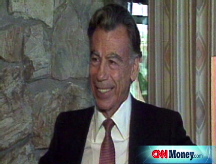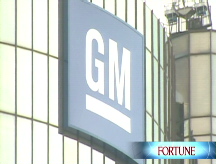Ford stands alone
While GM and Chrysler continue their flirtation - with Renault-Nissan watching from afar - the No. 2 automaker remains a wallflower.
NEW YORK (Fortune) -- With the U.S. auto industry sinking faster than a wildebeest in quicksand, the headlines have belonged to General Motors and Chrysler as they continue to work on a deal that might save the failing companies. Ford, meanwhile, has stayed above the fray, in the apparent belief that is has enough resources to survive the downturn - and a sufficiently robust plan to come out the other side when it does.
Ford's inaction isn't for lack of opportunities. It was courted by both of the other Detroit companies over the summer.
According to a knowledgeable source, GM chairman and CEO Rick Wagoner approached Ford executive chairman Bill Ford about a merger. Ford listened politely to the pitch from Wagoner but turned him down.
Chrysler chairman and CEO Bob Nardelli also approached Bill Ford about combining forces - this time in a three-way merger that included GM (GM, Fortune 500). Sensing desperation in Nardelli's approach, Ford said no again.
The source of Bill Ford's determination to remain independent, besides a desire to maintain control of his family's company, is a strong balance sheet.
At the end of the second quarter, Ford (F, Fortune 500) had $26.8 billion of cash on hand - likely enough to fund its operations into 2010. Ford also has some saleable assets in Volvo and in its 33.9% stake in Mazda - assuming it can find buyers with enough cash or a strong enough credit rating to execute a transaction. Ford also expects to get a share of some $25 billion in government loans that Congress has approved to help automakers convert to more fuel-efficient vehicles, which will also ease the cash crunch.
Ford's liquidity position hasn't prevented hand wringing by Ford dealers, however. At a regional dealer council meeting in Florida last week, one dealer announced that Ford would not be able to continue as manufacturer by the end of next year, and added that he expected government assistance to kick in if the company should falter. The automaker quickly moved to distance itself from the unauthorized comments.
The dealers' confidence was likely not enhanced by investor Kirk Kerkorian's decision, made public Tuesday, to perhaps sell his entire 6% stake in the company at a significant loss. Kerkorian paid up to $8.50 a share for Ford stock earlier in the year that he is now selling for $2 and change. Kerkorian said he's shifting his investment focus to other sectors of the economy.
The prospect of financial Armageddon hasn't put an end to the palace intrigue in Dearborn. The latest victim is chief financial officer Don LeClair. Other executives, complaining that LeClair was secretive and difficult to work with, threatened to quit if he wasn't moved aside, according to two people with knowledge of the situation.
LeClair was responsible for arranging $23.5 billion in financing two years ago that has helped keep Ford afloat - and that would be impossible to arrange today. He was close to CEO Alan Mulally, but Bill Ford concluded a change was necessary after hearing from the dissidents. LeClair was described as "shell-shocked" when he learned of the decision at a board meeting. The company declined to discuss what it called "rumors" or to make LeClair available for comment.
Last week, two outside directors also decided to leave, due to, they said, the press of other business. Sir John Bond, a former HSBC chairman who gave the board some substantial financial muscle, will be missed. Nokia chairman Jorma Ollila was a less vigorous presence.
How long Ford can remain on the sidelines is anyone's guess. Its recovery plan looks a little skimpy. According to a dealer, the Lincoln-Mercury franchise will shrink to eight vehicles by 2010 - three for Mercury and five for Lincoln-- from 11 today.
What could push Ford into the fray? Now that its stock-market capitalization has collapsed to $4.5 billion, some members of the Ford family, who control 40% of the shareholder vote, may be looking to cash out.
Furthermore, there's at least one more global player stalking the Detroit Three in search of a deal: Renault-Nissan. The Franco-Japanese company is supposed to be looking over Chrysler, but a smarter play might be to leave GM to sort out Chrysler's problems - and go after healthier Ford. Though CEO Carlos Ghosn has been repulsed before, the current times are sufficiently harrowing that any offer deserves a closer look. Even at Ford. ![]()
-
 The retail giant tops the Fortune 500 for the second year in a row. Who else made the list? More
The retail giant tops the Fortune 500 for the second year in a row. Who else made the list? More -
 This group of companies is all about social networking to connect with their customers. More
This group of companies is all about social networking to connect with their customers. More -
 The fight over the cholesterol medication is keeping a generic version from hitting the market. More
The fight over the cholesterol medication is keeping a generic version from hitting the market. More -
 Bin Laden may be dead, but the terrorist group he led doesn't need his money. More
Bin Laden may be dead, but the terrorist group he led doesn't need his money. More -
 U.S. real estate might be a mess, but in other parts of the world, home prices are jumping. More
U.S. real estate might be a mess, but in other parts of the world, home prices are jumping. More -
 Libya's output is a fraction of global production, but it's crucial to the nation's economy. More
Libya's output is a fraction of global production, but it's crucial to the nation's economy. More -
 Once rates start to rise, things could get ugly fast for our neighbors to the north. More
Once rates start to rise, things could get ugly fast for our neighbors to the north. More









